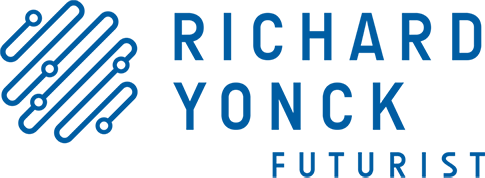The Intelligence Revolution (Part 2)
The Four Rs: Changing Jobs in a Changing World

The Intelligence Revolution will transform many aspects of our lives, but few as radically as work and employment.
By its very nature, progress is disruptive. Technological advances lead to the development of new markets and the withering away of old ones. They generate new laws and regulations. In the most extreme cases, they can even threaten our existence as a species. But of all of these changes, none touches us more personally and immediately than the those that affect our jobs.
Work puts a roof over our heads and food on our table. It makes it possible to provide for our family. If we’re fortunate, it contributes to our sense of purpose and identity.
But if change is disruptive, how much more upheaval will we see in coming years as the world undergoes accelerating change? The rate of technological advancement has been slowly increasing for many centuries, but only recently has it reached a point where we’re aware of it on practically a day-to-day basis. Every week, there are new breakthroughs and devices that will alter some aspect of our lives. This trend shows few signs of letting up. If anything, the increasing intelligence of our tools is only going to accelerate the rate of change further.
For generations, it was typical to perform the same trade as our parents and their parents before them and so on. In the middle of the 20th Century, many people worked for a single company throughout their entire career. By the end of the century, this had become far less common.
According to a longitudinal survey by the Bureau of Labor Statistics released in 2008, younger baby boomers held an average of 10.8 jobs between the ages of 18 and 42. (The Bureau doesn’t define or track career changes, contrary to a commonly quoted statistic about its frequency. Nevertheless, a general trend can still be extrapolated from the jobs numbers.) If much of this shift in job security is due to technological progress and the rate of that progress continues to accelerate, what will it mean for all workers and the society they support in the years ahead?
In the face of such change, we have little choice but to adapt. Attempting to hold on to older, less efficient work methods has failed since before the Luddites tried to sabotage mechanized looms in the early 1800s. The ability to produce more efficiently almost always results in increased productivity which lowers real prices. This is a difficult incentive to fight despite the upheaval it often brings.
Adapting to a rapidly changing world means shifting how we look at careers, identity and education. More and more, it’s going to become necessary to re-invent ourselves, matching our strengths and skill sets to the changing marketplace. With this new path identified, we’ll need to re-educate ourselves to prepare for work in new and changing fields. Over time, we’ll rebuild our careers, combining prior experience with our more recently acquired skills. Then, as technology and the fields it creates and supports continue to advance, the cycle will repeat and it will be necessary to do it all over again.
For many of us, adopting these Four Rs will feel very foreign, even threatening. Embracing change is not typically in our nature. But adapting to it is. The world we live and work in is being transformed whether we want it or not. As with all sea changes, we have a choice. We can swim with the tide or be overwhelmed by it.
Affordable higher education that continues throughout our lifetimes will be essential to making this possible. Likewise, regular career counseling. These will be necessary if we’re to maintain a work force that can support the many high tech fields that are sure to arise in the coming decades. The health of our entire economy depends on the right approach.
Progress is accelerating, changing the world before our eyes. It will bring many challenges, but with it many opportunities as well. To thrive in this rapidly changing world, we’ll need to recognize that our working lives will be changing as rapidly as everything else. The Four Rs may be one way we can adapt to an accelerating future.
- Re-Invent.
Re-Educate.
Re-Build.
Repeat.
